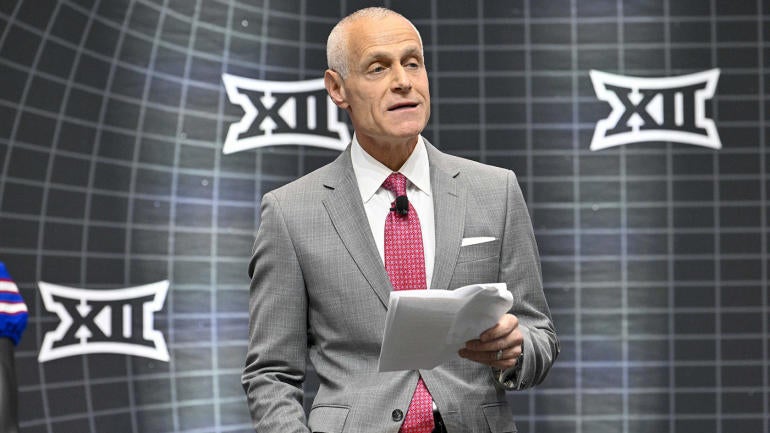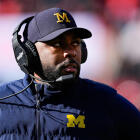
Allow me to become the 1 millionth sportswriter in history to quote "The Wire" as I recall a line from season 4, episode 4 of the critically acclaimed HBO series. Roland "Prez" Pryzbylewski, former policeman-turned-teacher, is watching a football game between NC State and Maryland when his wife asks him who is winning.
"No one wins," he answers. "One side just loses more slowly."
The line is poignant about many facets of life, and I was reminded of it this week with Colorado's unanimous vote approving a Big 12 return. It looks like a coup for the conference, and I understand why. Ever since Oklahoma and Texas announced they were leaving for the SEC, and with USC and UCLA following with a move to the Big Ten, the Big 12 and Pac-12 have been pitted against one another in a battle for survival.
For whatever reason, we all decided only one could survive. The past year has been filled with rumors of the Big 12 poaching Pac-12 schools (which, to be clear, the Big 12 was more than happy to make public). The Pac-12 denied it by telling the world how everybody was thrilled with their situation because It was only a matter of time until a new media rights deal came through. It was going to be a fantastic TV deal; the best TV deal you've ever seen. Just wait until it's announced in the next week, month, year or decade -- you'll see. The Pac-12 was going to live forever!
So when Colorado went Lee Corso and pulled the "Not so fast, my friend!" on the Pac-12, I understood why people thought the Big 12 "won," but I want to make one thing clear: The Big 12 didn't win anything, it simply bought more time.
I recently found out my 9-year-old Bernese Mountain Dog Frankie has histiocytic sarcoma -- a cancer that is the top killer of her breed. We decided to give Frankie radiation therapy, and thankfully, it has helped her quite a bit. She's moving around a lot better as the pain in her leg from the cancer has subsided, and her appetite has returned. For all intents and purposes, she's behaving like her old self. She's not going on long walks anymore, but other than that, everything else seems the same.
She still has histiocytic sarcoma, though. The radiation was palliative and helped her with the pain. It didn't cure the cancer, and at some point in the next 12 months (if we're fortunate to get that much time), she will be in too much pain to go on be put down.
Colorado returning to the Big 12 feels more like radiation than a cure. I know our attention spans get shorter by the day, but to say the Big 12 "won" ignores all the losses in recent years. We can't forget why the Big 12 was desperate to poach Colorado from the Pac-12 and why it's still actively looking to expand.
It has to.
Colorado left the Big 12 following the 2010 season. Since then, Missouri, Nebraska, Oklahoma, Texas and Texas A&M all left as well and for the same reasons: a better situation and more money. Colorado is the only one returning because Colorado is the only one that didn't find its better situation. It made a mistake. Colorado threw its lot in with a league struggling to find a foothold in the television markets that now dominate the sport over everything else.
Missouri, Nebraska and Texas A&M may not be winning as many games as they'd like in their new homes, but they're making a lot of money. Oklahoma and Texas will, too. But while Colorado may be guaranteeing itself $31 million a year from TV by returning to the Big 12, imagine how much more money Colorado would be getting if the Big 12 never disbanded.
Big 12 commissioner Brett Yormark deserves credit for getting the best deal possible and beating the Pac-12 to the punch, but you can bet he'd have had a much easier time selling a league that still had the Texas, Texas A&M, Oklahoma and Nebraska brands. Not only would the Big 12 be closer to the Big Ten and SEC financially in that aspect, but on the field as well.
That's not a slight to the on-field product the Big 12 plans to offer. Frankly, if this were only about football, there's a strong case to be made that the Big 12 is the most entertaining conference in the country. Without a clearly dominant program, the gap between the top and bottom is much closer than in any other conference, which will lead to entertaining seasons for a collection of fanbases who are quite passionate about their football. The league may struggle to win national titles, but contrary to popular opinion, national titles aren't the only thing in this sport that matter.
The problem the league faces is that while the $31 million Colorado and the rest of the league will pocket annually is better than what's on offer in the Pac-12, the Big Ten and SEC will still make far more. Every year, the gap between those two leagues and the Big 12 will widen a little further until the situation becomes untenable to somebody, and it will eventually find itself in the Pac-12's situation.
So while Colorado's move to the Big 12 is good for the school and conference in the short term, nobody wins here. The Big 12 is simply losing more slowly.
![[object Object] Logo](https://sportshub.cbsistatic.com/i/2020/04/22/e9ceb731-8b3f-4c60-98fe-090ab66a2997/screen-shot-2020-04-22-at-11-04-56-am.png)


















